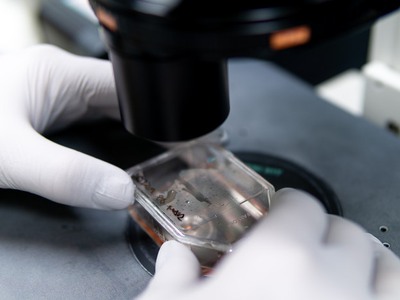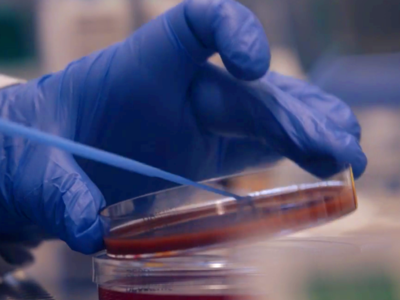Researchers from the University of Skövde, the University of Gothenburg, Sahlgrenska Academy, Lund University and the University of Turku have made significant advances in the early detection of gynaecological cancer. They have identified biomarkers that can indicate if someone has cancer. This discovery may enable faster healthcare responses in the future, thereby increasing the patient's chances of survival.

In Sweden, 2,753 people were diagnosed with gynaecological cancer in 2024. Early detection is crucial for increasing the chances of survival.
Each year, approximately 325,000 women receive a life-altering diagnosis of gynaecological cancer. For those who develop ovarian cancer, the future is often uncertain; only half survive five years after diagnosis. When cancer is detected late, survival rates drop drastically. However, there is now a glimmer of hope.
The research has made crucial progress by identifying specific biomarkers that could enable earlier detection of gynaecological cancer. This new discovery could eventually be integrated into healthcare, improving the chances of successful treatment.
"We have identified several protein variants that can help distinguish between benign and malignant tumours. We are currently testing a panel of genetic changes to enhance the accuracy of our diagnoses further," says Benjamin Ulfenborg, Docent in Bioinformatics at the University of Skövde.
Biomarkers – the body’s warning signals
Cancer can hide in the body for a long time before symptoms appear, making early diagnosis challenging. The research team employs a technique combining protein analysis and genetic changes. These biological markers act as the body's warning signals, capable of revealing the disease long before it spreads.
A specific part of the research targets women with endometriosis, a chronic condition affecting about one in ten women of reproductive age. The researchers have found that certain genetic alterations are shared between endometriosis and cancer, which may give new insights into which patients may be at greater risk of developing cancer later.
"For these women, our research could lead to more personalised monitoring and earlier detection of potential cancer changes," says Benjamin Ulfenborg.

Benjamin Ulfenborg, Docent in Bioinformatics at the University of Skövde.
The future of healthcare: Early diagnosis and fewer invasive procedures
The method being developed by the researchers offers several advantages. Early cancer detection can save lives and reduce the need for extensive surgical interventions and treatments with severe side effects, granting patients more years of good health and better quality of life.
"Our goal is for this method to be routinely used in healthcare. By detecting cancer at an early stage, we can prevent unnecessary suffering and give more women the opportunity to live healthier lives," adds Benjamin Ulfenborg.
A reminder of the importance of research
The project is a collaboration between several research groups. The University of Gothenburg, Sahlgrenska Academy and Lund University provide clinical samples and genetic analyses, Turku University is where the technology for measuring the protein markers was developed, while the University of Skövde contributes expertise in bioinformatics and statistical modelling. Together, they develop algorithms capable of handling large volumes of biological data to improve diagnostics.
Research on the early detection of cancer is crucial to improving survival rates.
"Every success in this field gives more women a chance to survive their disease and live longer, healthier lives," concludes Benjamin Ulfenborg.
The research has been funded by:
- Sjöberg Foundation
- ALF
- Swedish Cancer Foundation
- BioCARE, a strategic research area at Lund University
- Mrs Berta Kamprad’s Cancer Foundation
- Cancer and Allergy Foundation
- Region Västra Götaland
- VINNOVA
- Swedish Research Council
- Roche Diagnostics Scandinavia
- Assar Gabrielsson Foundation
- Lena Wäpplings Foundation
- Jane and Aatos Erkko Foundation
- Nordic Cancer Union
- Hjalmar Svensson Foundation
- Gothenburg Medical Society
Scientific publications
2024
Human Reproduction
2024. Article.
https://doi.org/10.1093/humrep/deae043
2022
International Journal of Cancer
2022. Article.
https://doi.org/10.1002/ijc.34111
2021
Clinical Chemistry and Laboratory Medicine
2021. Article.
https://doi.org/10.1515/cclm-2021-0510




